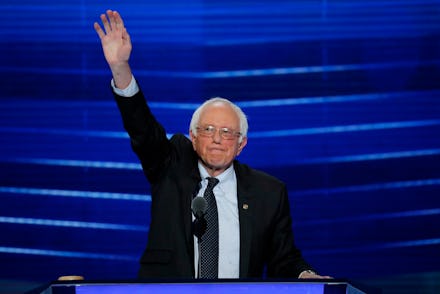Bernie Sanders Takes on an Unfamiliar Role at the 2016 DNC: Party Foot Soldier

PHILADELPHIA — Bernie Sanders hoped he would take the stage at the Wells Fargo Center to accept a decidedly improbable role for an anti-establishment democratic socialist.
On Monday night, he did.
But while Sanders wasn't here to accept the Democratic Party's presidential nomination, he did assume a responsibility he eschewed for most of his five-decade political career: party foot soldier.
The same senator who once encouraged a primary challenge to President Barack Obama's 2012 re-election bid and proudly clung to his independence from a centrist Democratic Party enthusiastically took up the mantle of Democratic partisan as he addressed delegates in a primetime speech at the party's convention to make his case for presumptive nominee Hillary Clinton.
Seeking to marry his progressive idealism with a hard-nosed pragmatism about the stakes of the 2016 election, Sanders sent an unmistakable message to his most fervent supporters. And though he didn't put it quite as bluntly as Sarah Silverman, his message was much the same: Any Sandernista who isn't backing Clinton is "being ridiculous."
Framing the choice: As expected, Sanders ticked off the signature accomplishments of his stronger-than-expected primary bid, from his grassroots fundraising prowess to the progressive populist planks featured in this year's Democratic platform.
But while Sanders' bid aimed to challenge long-held notions of the politically possible — often dinging the Democratic establishment's alleged timidity along the way — he sought on Monday night to remind progressives of what the party establishment had given them.
"The Republicans want us to forget that as a result of the greed, recklessness and illegal behavior on Wall Street, our economy was in the worst economic downturn since the Great Depression," Sanders said. "We have come a long way in the last seven and a half years, and I thank President Obama and Vice President Biden for their leadership in pulling us out of that terrible recession."
Clinton's election, Sanders said, would build on Obama and Biden's achievements — while forestalling what he depicted as the nightmare of a Donald Trump presidency.
"If you don't believe this election is important, if you think you can sit it out, take a moment to think about the Supreme Court justices that Donald Trump would nominate and what that would mean to civil liberties, equal rights and the future of our country," Sanders said, after lambasting Trump's opposition to a federal minimum wage increase and the Republican nominee's rhetoric targeting "Latinos, Muslims, women, African-Americans and veterans."
A pragmatic socialist: Though it was Clinton who pitched herself in the primary as the candidate of compromise — "a progressive who likes to get things done" — Sanders showed a pragmatic streak of his own on Monday night, praising Clinton even on topics where she remains more moderate.
While he campaigned vigorously for a single-payer, Medicare-for-all health care system, he lauded Clinton for her more modest proposal to allow people a publicly adminstered health care plan that would compete with private insurers.
"This campaign is about moving the United States toward universal health care and reducing the number of people who are uninsured or under-insured," he said. "Hillary Clinton wants to see that all Americans have the right to choose a public option in their health care exchange."
And while Clinton hasn't embraced Sanders' call for universal free public college, only favoring that benefit for those from families earning less than $125,000 annually, Sanders noted that her proposal would affect "83% of our population."
Still, Sanders acknowledged, "It is no secret that Hillary Clinton and I disagree on a number of issues. That's what this campaign has been about. That's what democracy is about."
Sanders' message: His conception of the perfect hasn't changed — but he's not about to make it the enemy of the good.
Will it move the needle? Though a recent Pew poll found nearly 9 in 10 of Sanders' primary backers were prepared to vote for Clinton, raw wounds from the hard-fought primary battle have been on full display here, exacerbated by the leak last week of Democratic National Committee emails showing DNC staffers mulling ways to undermine Sanders' candidacy.
There were scatterings of boos whenever Sanders mentioned Clinton's name during his speech, which followed hours of street protests and convention disruptions from his die-hard fans. And some in the convention center on Monday voiced suspicion of Clinton's commitment to progressive principles.
The platform "reflects many of his progressive agenda ideas that he got the Clinton campaign to accept and move forward with," said Laurie Dodd, a Sanders delegate from Virginia. But she questioned whether Clinton's "commitment to the platform is as strong as they say it is."
Former Rep. Dennis Kucinich of Ohio, who waged left-wing Democratic presidential campaigns in 2004 and 2008, pronounced himself unimpressed with Sanders' remarks.
"The path to unity cannot gloss over the divisions in the party," he said. "And Bernie was in a position to be able to address some of them here tonight. He didn't do that at all."
The rapidity with which Sanders has accommodated himself to a Democratic standard-bearer whom he regularly castigated for her corporate ties and alleged errors in judgment may spark feelings of disillusionment in many of those supporters — feelings on which Trump hopes to capitalize.
Don't buy it, Sanders told his supporters Monday night.
"In these stressful times for our country, this election must be about bringing our people together, not dividing us up," he said. "While Donald Trump is busy insulting one group after another, Hillary Clinton understands that our diversity is one of our greatest strengths."
Debbie Wasserman Schultz could hardly have put it better herself.
Stefan Becket contributed reporting.
Read more: